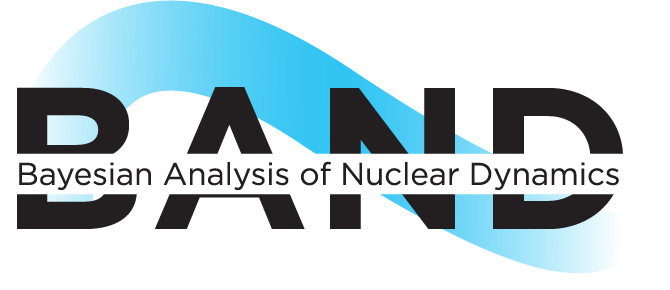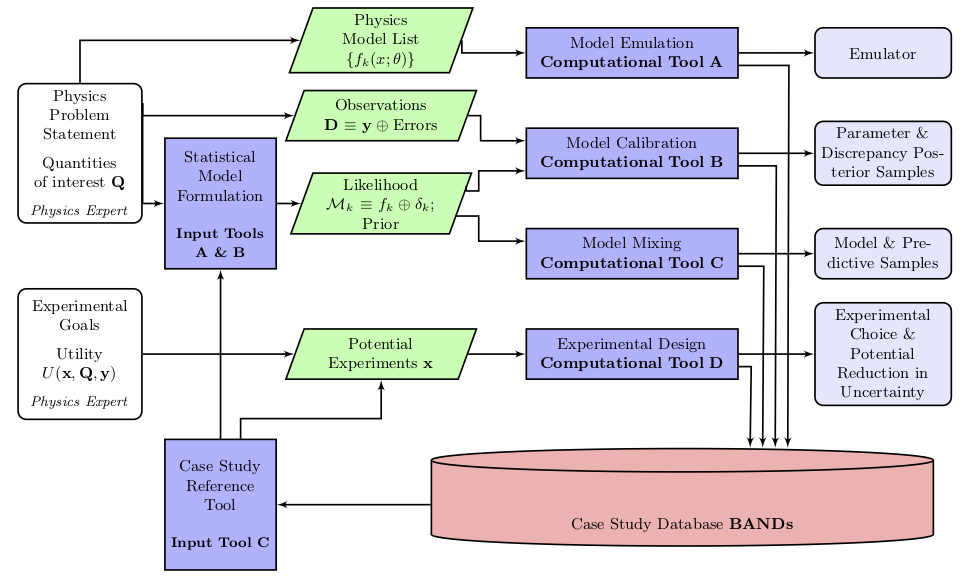
Check out the new tools and examples in BAND Framework v0.5!
See the BAND Manifesto in Journal of Physics G! (or on arXiv)
Nuclear physicists seek an accurate description of the properties of atomic nuclei, collisions between nuclei, and extreme environments such as the first few seconds of our universe or the interior of a neutron star. These situations involve many particles interacting through complex forces. They’re each described by a number of different models: these typically do a good job of explaining the results of experiments that have already occurred. The models don’t do as well predicting what will happen in future experiments or in environments that are inaccessible here on Earth.
The Bayesian Analysis of Nuclear Dynamics (BAND) Framework will use advanced statistical methods to produce forecasts for as-yet-unexplored situations that combine nuclear-physics models in an optimal way. These will be more reliable than the predictions of any individual model. BAND’s forefront computer codes will be widely available and will facilitate the design of nuclear-physics experiments that can deliver the largest gain in understanding. The adoption of BAND’s tools in other sciences dealing with “model uncertainty” could spur broad scientific innovation. Undergraduate and graduate students working on BAND will gain a broad range of technical skills in data science, machine learning, nuclear physics, and high-performance computing.

BAND Code of Conduct
BAND is committed to fostering a safe, diverse, inclusive, and equitable environment that values mutual respect and personal integrity. Therefore, all participants in BAND activities will conduct themselves in a welcoming and professional manner, treating one another respectfully and considerately. This is particularly important in interdisciplinary work that brings together collaborators from different scientific backgrounds and cultures. Creating such a culture–one that is collegial, inclusive, and professional–is the responsibility of all collaboration members and meeting participants.
Those participating in BAND activities shall not discriminate against, harass, or bully others. If you observe inappropriate comments or actions and personal intervention seems appropriate and safe, you are encouraged to intervene in ways that are, insofar as it is possible, considerate of all parties involved. BAND members and meeting participants will not discriminate against, act in an inappropriate way, or make inappropriate statements related to aspects of each other’s identity such as age, race, ethnicity, perceived or actual social class, sexual orientation, gender identity, gender expression, marital status, nationality, political affiliation, religion, ability status, and educational background. No kind of harassment (including sexual harassment) or bullying will be tolerated.
Bullying is unwelcome, aggressive behavior involving the use of influence, threat, intimidation, or coercion to dominate others. Harassment includes but is not limited to: inappropriate or intimidating behavior and language, unwelcome jokes or comments, unwanted touching or attention, offensive images, photography without permission, and stalking. Sexual harassment is unwelcome sexual advances, requests for sexual favors, and other verbal or physical conduct of a sexual nature that creates an intimidating, hostile, or offensive environment.
Violations of this code of conduct policy should be reported to meeting organizers and/or the BAND “Community Leaders”: Daniel Phillips (phillid1@ohio.edu), Dick Furnstahl (furnstahl.1@osu.edu), Özge Sürer (surero@miamioh.edu), Frederi Viens (fv15@rice.edu), and Stefan Wild (wild@lbl.gov). Sanctions may range from verbal warning, to ejection from the meeting, to a suspension from future BAND activities, to the notification of appropriate local authorities. Retaliation for complaints of inappropriate conduct will not be tolerated and will result in an escalated sanction.
News ( see all News)
February 6, 2025Congratulations to BAND researcher, Kyle Godbey, and his Ohio University and AFIT collaborators, on the publication of their New database website for nuclear level densities in Computer Physics Communications. The Current Archive of Nuclear Density of Levels (CANDL) hosts experimental nuclear level density datasets from a variety of techniques and energy ranges. The database is interactive and user-friendly, allowing researchers nuclear physics, reactor design, and other communities to search, visualize, fit, and export data with minimal effort.
January 22, 2025Dimensionality reduction is a way to reduce the computational burden of expensive nuclear models and simulations. The technique--which has been a focus of BAND's research--was highlighted in this video. The video, produced by Pablo Giuliani, Kyle Godbey, and Edgard Bonilla won second place in the 2025 Annual Reviews of Nuclear and Particle Science video competition.
December 23, 2025v0.5 of the BAND Framework is out! This version includes updates of existing BAND packages such as surmise, jitr, PUQ, and Taweret. It also includes new capabilities, e.g., pybmc, a Python package for performing Bayesian model combination on various predictive models, and ModelDiscrepancy, a set of notebooks exemplifying model-data comparison in the presence of theoretical uncertainties.
November 30, 2025BAND members Kyle Beyer, Dick Furnstahl, Kyle Godbey, Sunil Jaiswal, Filomena Nunes, Daniel Phillips, Alexandra Semposki, and Özge Sürer gave talks at the recent 11th workshop on Information and Statistics in Nuclear Experiment and Theory, which took place at the European Center for Theoretical Studies in Nuclear Physics in Trento, Italy.
November 21, 2025BAND senior investigator Witek Nazarewicz and Research scientist Kyle Godbey co-authored a paper, out this week in Physical Review Research, that emphasizes the need for robust uncertainty quantification in multi-stage modeling of ultra-relativistic heavy-ion collisions. Knowledge of nuclear shapes obtained in experiments at low energies could provide important benchmarks for such simulations.
October 31, 2025BAND featured strongly at the American Physical Society Division of Nuclear Physics meeting that took place October 17-20 in Chicago, IL. BAND members Alexandra Semposki, Kyle Godbey, Frederi Viens, and Ozge Surer gave talks as part of the workshop "Systematic and Model Uncertainties in Nuclear Experiment and Theory: new tools, techniques, and opportunities for collaboration" while Filomena Nunes and Daniel Phillips presented contributed talks on uncertainty quantification in nuclear reaction theory.